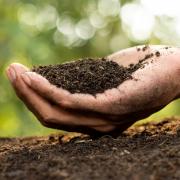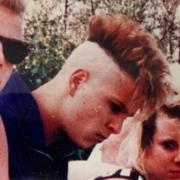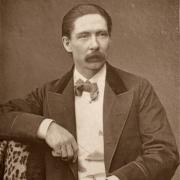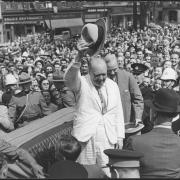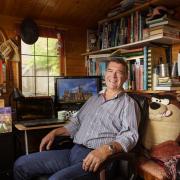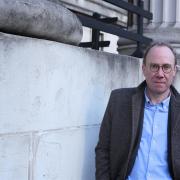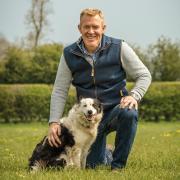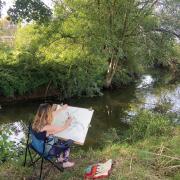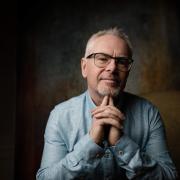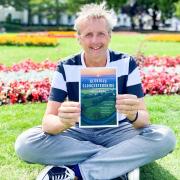Katie Jarvis talks to Countryfile’s John Craven, a man of many parts: countryside champion, pioneering presenter and interviewer of stars
So - here are some scenes (that I’ve picked out and love) from the life of John Craven.
Firstly, it’s the 1950s, and a teenager from the cobbled streets of Leeds (working class background; proud of it) has made a name for himself by transforming the local Baptist church magazine – the Parader - from a staid set of coffee morning announcements into a mini Daily Express. (Probably much to the surprise of any staid, coffee-drinking members of the congregation.)
He’s gone for big headlines.
Cracking interviews.
So much so that it’s grabbed the attention of ITV. Would this young chap - John Craven - like to appear on The Sunday Break (a youth club of the air; a ‘God Slot’) to talk about this radical redesign?
Mr Jones, the TV press officer, drives him to the studios (based in a converted ABC cinema in the Manchester suburbs), where John is told he can also join the regulars when they chat, on air, to the show’s other guests.
(If you’re thinking those headline guests might well include local vicars, curates and disgruntled coffee-morning organisers, then think again…)
Well, there is a Reverend; but he just happens to be the Rev David Sheppard, English Test cricketer (and, later, Bishop of Liverpool.)
Plus Sam Wanamaker, starring in Othello at Stratford.
And none other than Salford artist LS Lowry.
‘He was wonderful,’ John later recalled. ‘He told me how he became an artist because one day he missed the train into Manchester from Salford. He looked out over the view and saw people scurrying around: he thought, ‘I’ll go home and paint that.’
‘And that’s how he started on his matchstick men.’
The scene shifts to January 28, 1986; John is now editor and presenter of John Craven’s Newsround, the ground-breaking BBC programme for children and young people.
This award-winning show has already broken news stories (to the slight chagrin of some of the ‘grown-up’ news rounds) before most adults got a sniff of a hint of a whiff of them: Margaret Thatcher being elected leader of the Conservative Party (1975); the shooting and wounding of Pope John Paul II in St Peter’s Square (1981).
But this breaking story is different.
While general media have become somewhat blasé about shuttle missions, John Craven and team are following the launch of American space shuttle Challenger religiously: one of the astronauts is schoolteacher Christa McAuliffe, chosen from 11,000 applicants to be NASA’s teacher-in-space.
Roger Finn is presenting Newsround this afternoon. (John has been visiting the Stock Exchange for another Newsround story.)
They open with film of a dramatic fireball. No one at this early stage knows quite what has happened; but they know it’s not good.
‘Disaster for the shuttle; an explosion on Challenger,’ a rock-solid Roger tells viewers.
(‘I was 10 years old at the time and a huge fan of all things to do with rockets and space,’ a viewer recalls – decades later – on an internet forum.)
John Craven’s Newsround: never insensitive; never patronising, either. ‘If we had been suspected of talking down, we would have lost it straightaway, so we didn’t,’ John analyses.
‘We had a lot of scoops, mainly because we were on at 5 o’clock and, for many years, we were the first television news bulletin of the day.’
Now – for a final bit (for the moment) of JC nostalgia – John is at Highgrove, for BBC’s Countryfile, interviewing (the then-) Prince of Wales about his concerns for rural Britain.
‘I asked him if he watched Countryfile and he said he ‘couldn’t possibly say!’ But, later on, (the now-) Her Majesty The Queen Camilla told me they do watch Countryfile from time to time.’
(I mean, who doubted it? And who doesn’t watch…!)
In his 2019 memoir, Headlines and Hedgerows, John Craven writes that – on his first attempt to film a TV news story – a cameraman told him, ‘A movie camera either likes you or not and John, you’re lucky.’
John Craven believes you make your own luck.
Exactly.

I grew up on John Craven. Not saying that’s why I became a journalist (-turned-writer); but it’s always there – his Newsround – at the back of my consciousness. I can even vividly remember a 5 o’clock when it was announced that he’d become a dad. Gosh, I thought, jealously. Fancy having your own John Craven!
He’s at the sort of age, now, where you have to be careful about admitting you listened to his original broadcasts.
But I did.
And we’re both still going strong. Though he, arguably, stronger.
Still Countryfile-ing.
(Love that he provoked Jeremy Clarkson into tweeting recently. His fellow JC had a full-on tantrum about John wearing a hard hat and high vis in a ‘field for crying out loud’. *Actually, Jeremy, he was filming in a quarry, hence the protective clothing…*)
We’re talking, John and I, because he’s taking part in the Royal Three Counties Show this month, doing a q&a session, followed by a signing of his memoirs.
Ah, yes, he says: Three Counties. Always been at the heart of country living, these sorts of shows: ‘…a place where country people meet to have a chat, compare what their rivals are doing (!) and generally have a great day out. There is also a rare chance for town and country people to meet together and for country people to explain to ‘towners’ the kind of problems and joys they have from rural life.
‘So many livestock markets have closed in recent years, too. Country shows really are an opportunity for everyone to get together.’
Quite.
The ‘joys’. Those myriad joys. Such as the rare breeds that grace the shows still; beautiful breeds that commerce chased away for a while, until pioneers such as Joe Henson and Eric Freeman stopped the inexorable march of time – for just a moment – and made people take a long, hard look at what they were losing.
‘It’s great to see breeds like Gloucester Old Spot pigs and Gloucester cattle with their distinctive white tails no longer threatened. Not so long ago there was only one herd of Gloucester left. Now they’re no longer in danger.
‘Rare breeds are a great attraction at country shows - I don’t suppose a lot of urban people visiting these shows would realise just how threatened these species were.’
And the ‘problems’ of rural life?
John Craven has reported on and spoken about all sorts of countryside issues, over the years. River pollution; bird flu; coastal erosion; hare coursing. Recently, on racism in rural areas, following a University of Leicester study.
‘Let me say that I don’t speak out on issues,’ he corrects me. ‘I’ve always been a reporter who tries to seek every side of a story and present it in an unbiased way for the viewers or readers, so they can make up their own minds.
‘Having said that, racism is one issue on which the BBC is not unbiased; there is no place for racism anywhere, be it in the countryside or in our towns and cities. I was reporting on work being carried out by university researchers that seeks to discover the extent of racism in the countryside. They intend to talk to people from all backgrounds, to visitors and locals.
‘Many efforts are now being made to make our countryside truly inclusive – to me, it is a place where everyone should feel they belong, where no one should feel they don’t belong.’
So let’s – and this is not the non sequitur it might seem – return to Newsround. Because, when you look back, what a progressive programme that was, including the way it gave opportunities to people from backgrounds poorly represented: such as the wonderful journalist Lucy Mathen.
‘We were a very small team producing Newsround so it was essential that people working on it were people that believed in what we were doing. Our team tended to be young journalists making their way up in TV. Lucy was the first British-Asian reporter on TV news. Later on, she decided to leave journalism and became an eye surgeon; she now runs a big charity saving sight in India. We keep in touch and I’m proud to say I’m involved with her charity.’
Other Newsrounders included Helen Fielding (the mind-boggling moment when Bridget Jones’s derriere hits a camera while descending a fire-station pole – live on TV – was inspired by a less successful moment during Helen’s own reporting stint). Not to mention Krishnan Guru-Murthy, now a Channel 4 news presenter, and Julie Etchingham who frequently presents ITV News at 10.

I can’t help but ask John Craven about the great and the good he’s interviewed, over the years. Not just on Newsround or Countryfile, but Saturday Superstore, Multi-Coloured Swap Shop, and more.
Mrs Thatcher. Michael Caine. Tony Blair…
‘In my Newsround days I did get to meet a lot of notable people. I met one of my great sporting heroes, Pelé, in New York. We knocked a ball about together on one of those concrete pitches that are often portrayed in iconic films like West Side Story.’
Mother Theresa in Calcutta, too. ‘At her humble base in the backstreets, and we talked about all the work she did. In the courtyard as we spoke, the other nuns of her mission were all washing their spare saris. Mother Theresa explained to me that their only possessions were two saris and a bucket to wash them in. It was a very moving moment.’
But, he gently reminds me, Countryfile isn’t about celebrities; it’s about everyday lives and concerns in the Great British Countryside ‘which to me is one of the most beautiful places on Earth, even though so much wildlife is threatened’.
Even so, Countryfile has provided a fair share of headliners.
‘Dame Judi Dench is a great fan, and I’ve had the enormous pleasure of talking to her for the show. We even acted out a few words of Romeo and Juliet together! I also interviewed David Cameron when he was Prime Minister. We chatted over his concerns for the countryside, over a cup of tea.’
*************
Well, I’m glad Newsround (CBBC) is still around. News, succinctly and accurate told; sensitive, yet without pulling the punches. With all that children are currently going through, we need it more than ever.
And as far as the countryside is concerned, I’ve a feeling we need John Cravens more than ever, too. Long may he continue.

Quick-fire with John Craven:
John, who were your inspirations when you were starting out?
I suppose that when I started in TV news, the huge influence at the time was Richard Dimbleby, father of David and Jonathan Dimbleby. He was a consummate broadcaster and wordsmith. When I moved to take a more detailed interest to the countryside and nature it was, of course, David Attenborough who I looked up to.
Nature in the UK is in a parlous state. Which breeding and habitat improvement programmes do you think are having some of the most positive impacts?
Not so long ago there was only a handful of Red Kites left, in a far corner of Wales, with only one breeding female. But in the late 1980s and 1990s it was decided to reintroduce the Red Kite and I had the honour of helping to take part. I flew to Italy to collect a young Red Kite for the new breeding programme in the UK and it sat next to me, in a box. It was making a rather strange mewing noise, much to the surprise of fellow passengers! That bird along with a few others was released on top of the Chiltern Hills in Buckinghamshire and now, 30 years later there are Red Kites all over the place.
And then there’s the state of our waterways…
What a sad fact that so many of our beautiful rivers are unsafe to swim in and that pollution is killing their water life. No matter which political party is in power, I think that it’s fair to say that they will be forced to take stronger action to clean up our waters and prosecute those who are defiling them.
You have been honoured with an OBE for services to children’s and rural broadcasting. To whom would you give a medal?
There are many people I’ve met during my career whose unselfish actions have made our country and our countryside a better place. I’d give a medal to them all.




